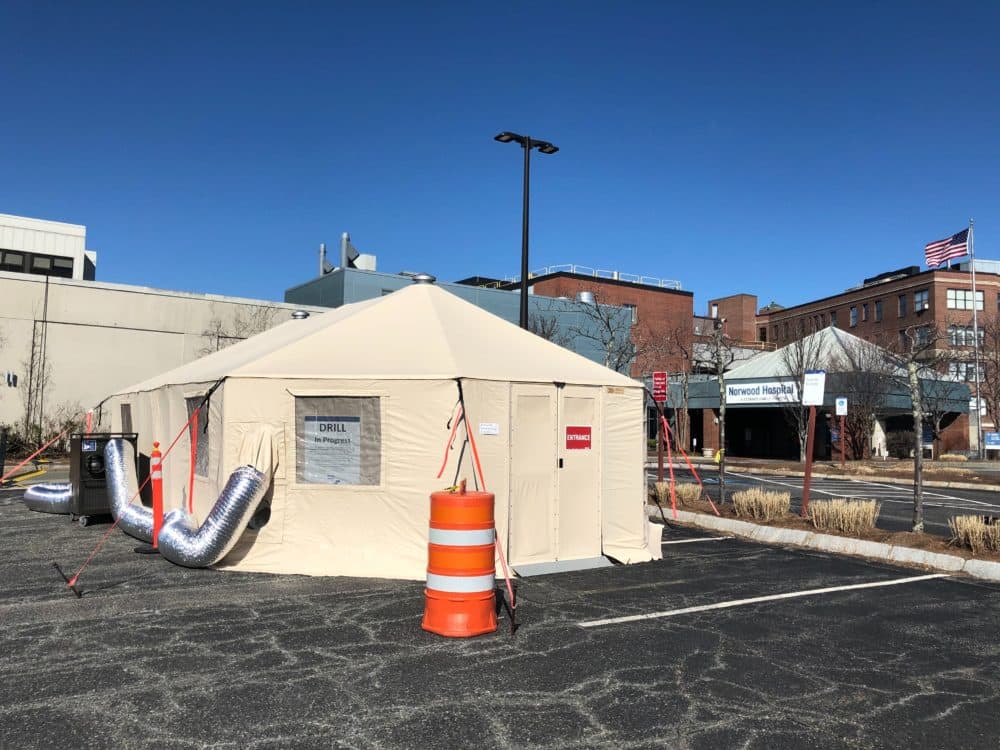Advertisement
Health Experts Are Scouring The State For Places To Put Temporary Emergency Hospitals
Resume
Health experts are not overlooking any building if it might work as a converted hospital. Hotels, university dormitories, convention centers and gymnasiums are all being floated as possible locations for field clinics to treat COVID-19 patients in the coming days and weeks, says Dr. Josh Barocas, an infectious disease doctor at Boston Medical Center.
“This is a time for creative solutions to a very complex problem – the surge of patients who might become critically ill or just infected with the virus and are going to actually need hospitalization,” he says.
Researchers believe the demand for hospital beds during the coronavirus pandemic will likely far outstrip the number of available beds. An analysis published by the Harvard Global Health Institute suggested that the need for intensive care beds might be 600% the state’s current capacity if infections don’t slow down.
But field clinics might be able to take some of the pressure off hospitals.
“Without that release valve, our hospitals will likely be stretched and stressed and over capacity,” Barocas says.
So health officials and experts are preparing to throw up field hospitals wherever they can. Tufts Medical Center says the hospital has already identified spaces on Tufts’ campus they might use and is working with local officials to convert nearby buildings into field clinics.
“We’re looking at any large-capacity building that has space to expand into, but also allow our teams to work in a regulated environment similar to a hospital, so we know who’s coming and who’s going,” says Nick Duncan, Tufts Medical Center deputy incident commander and director of emergency management.
Equipping and running field hospitals for potentially thousands of patients will be an Olympian task, says Dr. Adam Levine. He’s the director of the Center for Human Rights at Brown University and an emergency physician who’s set up field hospitals around the world.
“A tent works fine if that’s all you have,” Levine says. “But tents can be really uncomfortable."
A better choice, Levine says, is any building with separate rooms, bathrooms, amenities like heating and cooling, and plenty of open space.
"We found during the Ebola epidemic in West Africa, patients treated in [buildings] had lower mortality than patients treated in tents,” he says.
The most ideal environment for a field hospital may be empty or abandoned wings of existing medical facilities. State officials are considering currently empty nursing facilities, and local officials reached out to FoxRock Properties about converting the now-defunct Quincy Medical Center into a field hospital.
A FoxRock representative said the company is willing to cooperate as necessary, though the abandoned hospital is not currently in good condition to house patients.
Running a field hospital for COVID-19 patients will be especially difficult because the novel coronavirus is so contagious, Levine says. These field clinics will need measures like extra space between patients waiting for testing and treatment and special areas for clinicians to take protective gear on and off.
“For example, when [health workers] take off their protective equipment, they need to have a handwashing station where they can wash their hands between taking off each piece of equipment,” Levine says. “That’s what we did in our Ebola treatment center, and that would be a good practice for COVID-19 as well.”
Staff will need to be well trained and coordinated for field clinics to function as well, but there are only so many doctors and nurses in the state. That’s left an already stretched health care workforce wondering who will work these field hospitals and care for a surge of seriously ill patients.
“Hospitals are really curious about how that staffing would look,” says Duncan. “It's a little gray [as to] who would be staffing these areas at the state level.”
Duncan says the state should activate volunteer and professional emergency medical teams to help staff field hospitals alongside regular hospital personnel. State officials say they are calling for medical volunteers.
These efforts need to come together soon, Barocas says. If the volume of patients needing hospitalization for COVID-19 swells before these field hospitals are fully prepared to take them, “we could really be in a great deal trouble,” Barocas says. “We really do have to be very aggressive at this point.”
This segment aired on March 24, 2020.
